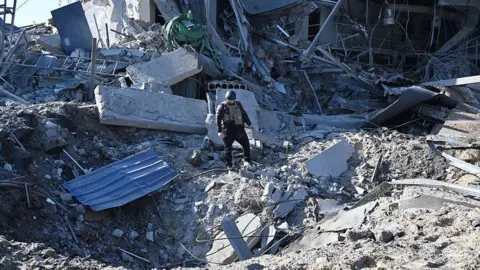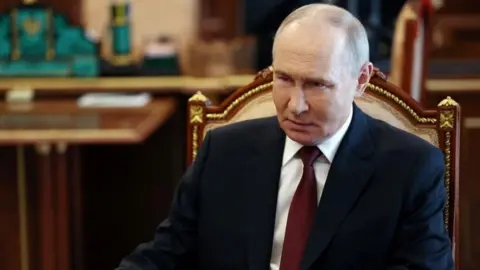Attacks continue despite Putin's 'Easter truce' pledge, Zelensky says
 Getty Images
Getty ImagesUkrainian President Volodymyr Zelensky has accused Russia of creating an "impression" of a ceasefire while still taking military actions in some places in Ukraine.
In the first six hours of the "Easter truce" - as ordered by Russian President Vladimir Putin - Zelensky said there had been 387 shellings and 19 assaults by Russian forces, and drones used 290 times. There are no reports of casualties.
Putin ordered his forces to "stop all military activity" in Ukraine from 18:00 Moscow time (16:00 BST) on Saturday until midnight on Sunday. Kyiv said it would also adhere.
Russia's defence ministry insisted all Russian forces had been adhering to the truce and accused Ukraine's army of breaking it.
Russia said Ukrainian units fired at the positions of Russian troops 444 times, carried out 900 strikes with unmanned aerial vehicles (UAV), 12 shellings, 33 strikes by UAVs and seven drops of munitions. The ministry said there were dead and wounded among the civilian population. It did not give any details.
Zelensky on Sunday morning said Moscow was "trying to create a general impression of a ceasefire, but in some places it does not abandon individual attempts to advance and inflict losses on Ukraine."
Accusing Russia of specific military actions, Zelensky added that "everywhere our warriors are responding as the enemy deserves, based on the specific combat situation."
Because Putin's ceasefire was announced minutes before it was due to take effect, an immediate, complete pause was always unlikely, but the BBC in Ukraine reports it has been quieter on the front lines.
Before Zelensky said there had been continued attacks in some areas, at midnight on Saturday there were no reported Russian drones or fighter jets in Ukrainian skies.
That is very rare.
The only report was that a Russian ship with missile launchers had been deployed to the Black Sea.
In the southern city of Odesa, it was silent. On Friday, before Moscow's announcement, air defences crackled throughout the night as Russian drones flew in from the direction of occupied Crimea.
Late on Saturday - hours into the truce - Zelensky had said: "If Russia is now suddenly ready to truly engage in a format of full and unconditional silence, Ukraine will act accordingly - mirroring Russia's actions."
"Our actions are and will be symmetrical. The proposal for a full and unconditional 30-day silence remains on the table — the answer to it must come from Moscow," he wrote on X.
Zelensky said Ukraine would be ready to extend a truce beyond 20 April, seemingly referring to an earlier proposal from the US for a 30-day ceasefire which Ukraine had already agreed to.
It seems now both Moscow and Kyiv want to show Washington they are serious about peace. The question of whether the Kremlin accepts Zelensky's offer to turn this truce from a 30-hour one to a 30 day one is central to any potential path to peace.
Few Ukrainians think that is remotely possible.
 Reuters
ReutersPutin had announced the temporary truce at a meeting with his chief of general staff, Valery Gerasimov.
"Based on humanitarian considerations... the Russian side announces an Easter truce. I order a stop to all military activities for this period," Putin told Gerasimov.
"We assume that Ukraine will follow our example. At the same time, our troops should be prepared to repel possible violations of the truce and provocations by the enemy, any aggressive actions."
The Russian defence ministry said its troops would adhere to the ceasefire provided it was "mutually respected" by Ukraine.
It is not the first time a pause in fighting has been suddenly announced - a previous attempt at a ceasefire during Orthodox Christmas in January 2023 fell apart after both sides failed to agree on a proposal.
Reacting to the recent truce announcement, a UK Foreign Office spokesperson said: "Now is the moment for Putin to truly show he is serious about peace by ending his horrible invasion and committing to a full ceasefire, as the Ukrainian government has called for - not just a one day pause for Easter."
Russia launched a full-scale invasion of Ukraine on 24 February 2022. It is estimated that hundreds of thousands of people - the vast majority of them soldiers - have been killed or injured on all sides.
The US has been directly talking to Russia as part of its efforts to end the war, but has struggled to make major progress.
Last month, Moscow came up with a long list of conditions in response to a full and unconditional ceasefire that had been agreed by the US and Ukraine.
US President Donald Trump on Friday warned Washington would "take a pass" on brokering further talks on ending the war in Ukraine unless there was quick progress.
He was speaking after Secretary of State Marco Rubio said the US was not "going to continue with this endeavour for weeks and months on end", as it had "other priorities to focus on".
"We need to determine very quickly now - and I'm talking about a matter of days - whether or not this is doable," he added.
"If it's not going to happen, then we're just going to move on."
